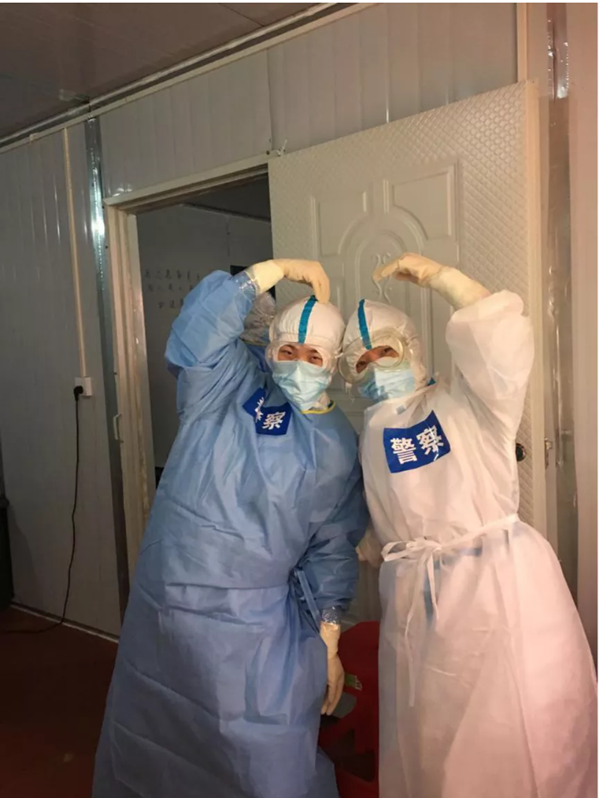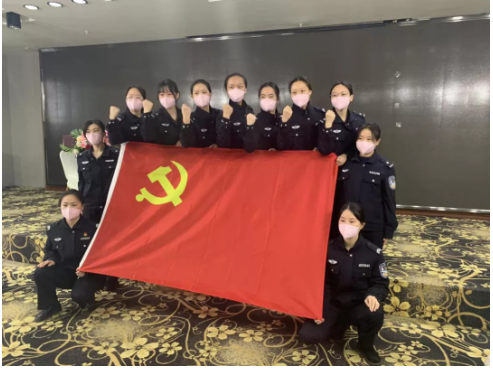Female police officer fights epidemic in hazmat suit
Li Qiong, a female police officer at a juvenile prison in Central China's Hunan province, never imagined that she would one day perform her duty in a hazmat suit. Then she was dispatched to a makeshift hospital in Wuhan, capital of Hubei province, the city hardest hit by the COVID-19 epidemic in China.

Distress on day one
Shortly after putting on a hazmat suit for the first time, Li, one of the first members of Hunan's Hubei-aiding work team to enter local makeshift hospitals, started to show symptoms like pains in her ears and head, chest distress and a shortage of oxygen, which would continue to dog her throughout her days in Wuhan.
Li's distress during her first day of working in the hospital was compounded by a colleague's delay in wearing the hazmat suit which kept Li in the ward one hour longer than scheduled.
"My eyeballs had turned red with deep marks on my face," she said of her appearance in the mirror. "I really worried about terrifying my colleagues who would enter the ward for the first time the next day."
More challenges
Li's main task in the ward was maintaining order. Without enough knowledge of the situation in the ward at the beginning, she chose to take an arduous but quite effective approach to carry out her work: patrolling over and over again to find and solve problems at their early stages.
In each of her seven-hour shifts, Li always concentrated on patrolling and rarely took breaks even though there were chairs where she could have sat down. If the time spent on commuting and putting on the hazmat suit is also counted, she wasn't able to have a meal or go to the toilet for 11 straight hours per day on average.
"After entering the battlefield, I identified myself only as a soldier," Li said firmly. "Since I was fully prepared, it was no big deal to experience some hardship."
After being appointed the superintendent of one of the sections of the hospital, Li became even busier as she had to communicate with police officers from across the country and continue to work even after returning to her hotel.
The heavy workload took a toll on her health, and she experienced dizziness several times. When speaking of Li, her colleagues all praised her excellent ability and good attitude toward her work.
Fight side by side
Considering that her crew members were all young female police officers from across Hunan’s prison system with an average age of 28, Li often organized group chats to make them quickly familiar with one another and mitigate their work pressure and nervousness.
"Instructor Li, are you scared?" some of her crew members were worried about getting infected despite the mental and safety training they had received before coming to Wuhan.
"I do feel scared," Li replied. "But I have confidence in myself, our professional medical teams and our Party organization."
Apart from relieving their mental pressure, Li also provided her crew with logistics support ranging from adult diapers to even spicy sauces which are particularly popular with folks from Hunan.
To her delight, Li's crew eventually shrugged off their fear and became adept at their work in the hospital.

Family support
It was the strong family support that enabled Li to focus on the fight against the epidemic in Wuhan.
Her mother was taking care of her father in a hospital when she told them that she would soon set off for Wuhan. "Try your best to do a good job," they said to her. "Don't worry about us."
Li's departure also tested her teenage daughter who learned to take good care of herself. "I will share my badge of honor with you," Li joked with her family on the phone.
Li also took great comfort from her husband who wrote her a heartwarming letter during her days in Wuhan, the first one he had written her in their 15-year marriage.
"Dear, I will support you as long as you are doing something meaningful that you love to do," said the letter.
This was Li's second trip to Wuhan. On the first visit she had dressed up in leisure clothing instead of a hazmat suit. "I expect to see Wuhan's bustling streets again when the epidemic is over," she said.

Ministry of Justice of the
People's Republic of China
All rights reserved. Presented by China Daily.
京ICP备13016994号-2


